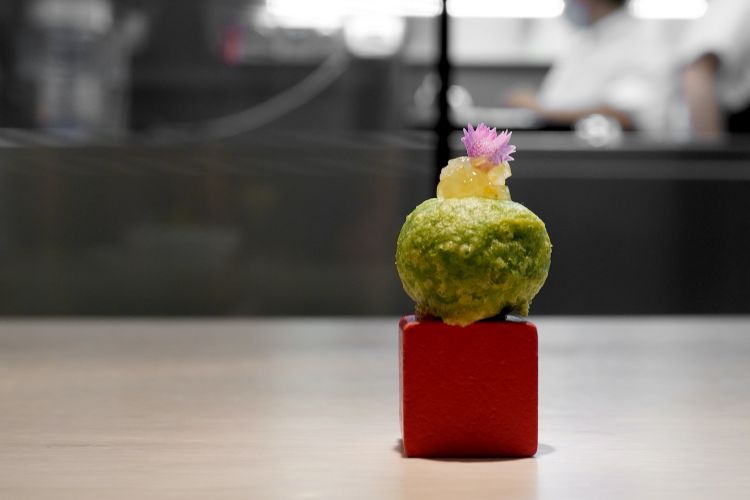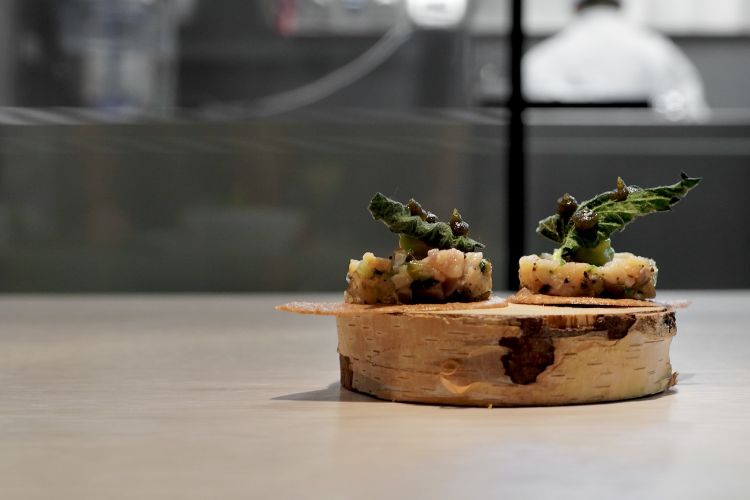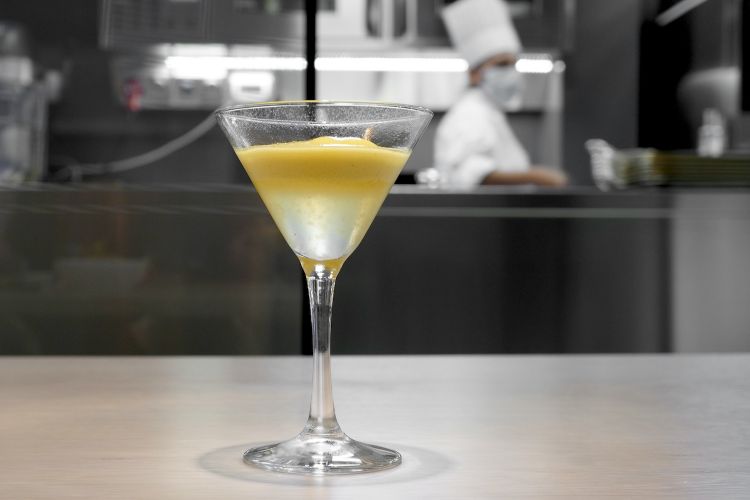«Cooking is culture. Cooking is anthropology», says Luca Landi, chef at Lunasia at Plaza e de Russie in Viareggio. And he adds: «So my cuisine wants to be a personal and creative expression, that takes into account the territory and the memories of the rural and artisanal world from which I come from. But with an international take that mirrors my career. Gourmet without any doubt. I want to give my guests a different postcard of Versilia», that can portray a tasty Tuscany, faithful to its roots, but also contemporary in its culinary expression. A practical example: Montaione – one of the “Borghi più belli d’Italia” [the most beautiful villages in Italy] – is a small village in Valdelsa near Florence; here Landi finds pigs («with a nice structure, of at least 20 kg, not the Spanish suckling pigs») that he marinates twice. First following the classic local recipe, with garlic, lardo, herbs and spices; the second with a “technical and modern” marinade, 48 hours covered in a layer of spelt from Garfagnana and on top Aspergillus oryzae which forms a mould that softly de-structures the meat, making it soft. The result – chargrilled – is one of the best pork I’ve ever eaten, if not the absolute best: very succulent, tasty, with a nice bite that then becomes a charming and voluptuous roundness, the aroma of the embers, the crispy rind, the liver like a spicy candy, the balance given by the baby onion with (wisely used) saffron, apricots with miso and a cream of fish roe, hence a sapidity of iodin, an aromatic sweetness and a balanced acidity.
A fine dish that comes from a beautiful idea of cuisine «which I believe – pardon me if I might sound proud – can have an educational function too». Landi explains (and we agree): «Fine dining must be first of all about good food, of course. But it’s not just good food, or else it wouldn’t be worth the cost: instead, it must offer something worth telling, and worth remembering».
For Landi that something is his contemporary Versilia, «which starts with the areas that were reclaimed» and include all the area that was once full of marshes, hence unhealthy because of malaria and which now has one plot after the other, thanks to the public works started in the 18th century (following the actions of the Roman age and then of the Republic of Lucca) after an order of the Medici family, which changed the course of the then river Sala – now called “Versilia” – and reclaiming over the centuries many marshlands so they could be farmed. «Here, between Massaciuccoli, Torre del Lago and Migliarino, the agricultural activity has been present for over 300 years and has stratified. It has changed over time: before, they would grow the red rice of Massarosa (in the 20th century, the rice fields covered 650 hectares; the original genome has been lost), and then they started cultivating sorghum, and then hop…». Now there’s a magnificent production of vegetables, «often facing the sea, hence very saline, a sort of French pré-salé. I also buy hibiscus here. We have large fields of eucalyptus, and the largest production of lotus flowers that inspired Puccini the imagery of Madama Butterfly, given that he never visited Japan». Further south there’s the Parco di San Rossore, with the presidential estate «and around 200 farms that have been following the same processes for 200 years, giving excellent products». Then we move north, to the mountain area, «above Camaiore there are many other farmers-keepers with genomes of fruits and vegetables of the highest quality: they have a small production and part of the harvest is preserved to keep the seeds». And so on, up to the Alpi Apuane. A «huge range of vegetables. To me this is happiness», a palette of colours-flavours that Landi enhances, «I’ve always thought that vegetables represent a place more than proteins. I portray this reality, with my language which also derives from my experience abroad. I meet the farmer and we don’t just talk of carrots, but of his knowledge of the territory too».
All this set of ideas would suggest a rather traditional cuisine … «No: I’m not tied to this story, but I put in the dish what I am, without preventions, without setting limits». The essence of Landi can also be found in his biography: born in 1974, he’s originally from Bagni di Lucca, in the middle of the Valle del Serchio, on Lucca’s side of the Apennines, right above Viareggio, a city that adopted him and that he loves «because I adore the sea. And because Versilia here is lively all year round, not just in the summer». In Landi’s cuisine there’s an idea of craftmanship that comes from his dad, «he made statues with plaster, with my brother we have now reached the third generation in this business typical of Lucchesia. Sunday lunch was the time when all the family met: a ritual that fascinated me since I was a child. At 7 I expected to cook with my mum», a destiny already written, «this is why I want to be a craftsman cook: to present my individual work, but which can be replicated». And then there is in Landi also the technique and international approach that derive from his training, above all,– after his first teacher, the iconic Angelo Paracucchi – at Enoteca Pinchiorri in Florence, at Louis XV in Monte Carlo and at Celler di Can Roca in Girona.
Today the chef pursues an ambitious, courageous, inviting line of cuisine: vegetal and animal ingredients are on the same level in the dish and vegetables, occasionally, can also stand by themselves, for vegetarians’ needs: «Take an artichoke. I use every part, with the roasted scraps I make a broth in which I cook and glaze the artichoke itself, so as to concentrate the flavours. The result is already good as it is. I can add, if I want, a filet of monkfish as a second element, with equal dignity, but even without the animal proteins the dish would already work». When you taste his Semini pasta cooked risotto style, with eel, cream of plum and wild garlic, you think of how they would taste without the eel, and you’re convinced that yes, the chef is right.
And now our dinner, with photos from Tanio Liotta.

Croquette filled with slipper lobster, breaded with potatoes and herbs, a gel of wild garlic

Biscuit of oats and spices with trout from the Alpi Apuane marinated and smoked, cream of avocado, chips of nettles and gel of seaweeds

A pairing with White Mary, with tomato water seasoned with lemon and vodka, plus kombucha